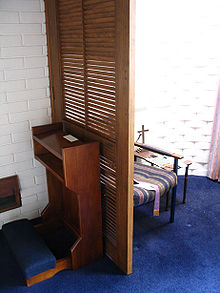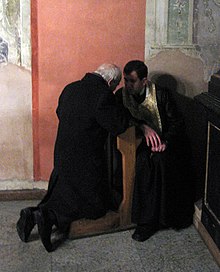A
confession is a statement made by a person acknowledging
some personal fact that the person would prefer to keep hidden. The term
is generally associated with an admission of a moral or legal wrong. A legal confession is an admission of some wrongdoing that has legal consequence, while a confession in religion is usually more akin to a ritual by which the person acknowledges thoughts or actions considered sinful
or morally wrong within the confines of the confessor's religion.
Socially, however, the term may refer to admissions that are neither
legally nor religiously significant.
The term derives from "something (“ion”) spoken (“fess”) in the presence of or with (“con”) someone else"
"Confess" and "Confessing" redirect here. For the evangelical protestant movement, see Confessing Movement. For statements of faith, see Confession of faith. For other uses, see Confess (disambiguation) and Confession (disambiguation)
Catholicism
Main article: Sacrament of Penance (Catholic Church)

Modern confessional in the Church of the Holy Name, Dunedin, New Zealand. The penitent may kneel on the kneeler or sit in a chair facing the priest (not shown)
In Catholic teaching, the Sacrament of Penance is the method of the Church by which individual men and women may confess sins committed after baptism and have them absolved by a priest. Although it is not mandatory, the Catholic rite is usually conducted within a confessional box, booth or reconciliation room. This sacrament is known by many names, including penance, reconciliation and
confession (
Catechism of the Catholic Church,
Sections 1423-1442). While official Church publications always refer to
the sacrament as "Penance", "Reconciliation" or "Penance and
Reconciliation", many laypeople continue to use the term "Confession" in
reference to the Sacrament.
The Catholic Church teaches that sacramental confession requires
three "acts" on the part of the penitent: contrition (sorrow of the soul
for the sins committed), disclosure of the sins (the 'confession'), and
satisfaction (the 'penance', i.e. doing something to make amends for
the sins).
[4] The basic form of confession has not changed for centuries, although at one time confessions were made publicly.
Typically, the penitent begins sacramental confession by saying,
"Bless me Father, for I have sinned. It has been [time period] since my
last confession." The penitent must then confess what he/she believes to
be grave and mortal sins, in both kind and number,
[6] in order to be reconciled with God and the Church. The sinner may also confess venial sins; this is especially recommended if the penitent has no mortal sins to confess. According to the
Catechism,
"without being strictly necessary, confession of everyday faults
(venial sins) is nevertheless strongly recommended by the Church. Indeed
the regular confession of our venial sins helps us form our conscience,
fight against evil tendencies, let ourselves be healed by Christ and
progress in the life of the Spirit. By receiving more frequently through
this sacrament the gift of the Father's Mercy, we are spurred to be
merciful as He is merciful".
Eastern Orthodoxy and Eastern Catholicism

Russian Orthodox priest hearing confessions before Divine Liturgy, Church of the Protection of the Theotokos, Düsseldorf, Germany.
In general, the Orthodox Christian chooses an individual to trust as
his or her spiritual guide. In most cases this is the parish priest, but
may be a starets (Elder,
a monastic who is well known for his or her advancement in the
spiritual life) or any individual, male or female, who has received
permission from a bishop to hear confession. This person is often
referred to as one's "spiritual father" or "spiritual mother". Once
chosen, the individual turns to his spiritual guide for advice on his or
her spiritual development, confessing sins, and asking advice. Orthodox
Christians tend to confess only to this individual and the closeness
created by this bond makes the spiritual guide the most qualified in
dealing with the person, so much so that no one can override what a
spiritual guide tells his or her charges. What is confessed to one's
spiritual guide is protected by the same seal as would be any priest hearing a confession. While one does not have to be a priest to hear confession, only an ordained priest may pronounce the absolution.
Confession does not take place in a confessional, but normally in the main part of the church itself, usually before an analogion (lectern) set up near the iconostasion. On the analogion is placed a Gospel Book and a blessing cross. The confession often takes place before an icon of Jesus Christ.
Orthodox understand that the confession is not made to the priest, but
to Christ, and the priest stands only as witness and guide. Before
confessing, the penitent venerates the Gospel Book and cross, and places
the thumb and first two fingers of his right hand on the feet of Christ
as he is depicted on the cross. The confessor will often read an
admonition warning the penitent to make a full confession, holding
nothing back.
In cases of emergency, of course, confession may be heard anywhere. For this reason, especially in the Russian Orthodox Church, the pectoral cross that the priest wears at all times will often have the Icon of Christ "Not Made by Hands" inscribed on it.
In general practice, after one confesses to one's spiritual guide,
the parish priest (who may or may not have heard the confession) covers
the head of the person with his Epitrachelion
(Stole) and reads the Prayer of Absolution, asking God to forgive the
transgression of the individual (the specific prayer differs between
Greek and Slavic use). It is not uncommon for a person to confesses his
sins to his spiritual guide on a regular basis but only seek out the
priest to read the prayer before receiving Holy Communion.

A penitent confessing his sins in the former Latin rite Catholic, now Ukrainian Byzantine Rite Greek-Catholic church of the Bernhardines in Lviv, Ukraine.
In the Eastern Churches, clergy often make their confession in the sanctuary. A bishop, priest, or deacon will confess at the Holy Table
(Altar) where the Gospel Book and blessing cross are normally kept. He
confesses in the same manner as a layman, except that when a priest
hears a bishop's confession, the priest kneels.
Orthodox Christians should go to confession at least four times a year; often during one of the four fasting periods (
Great Lent,
Nativity Fast,
Apostles' Fast and
Dormition Fast). Many pastors encourage frequent confession and communion. In some of the
monasteries on
Mount Athos, the monks will confess their sins daily.
Orthodox Christians will also practice a form of general confession,
(or manifest contrition), referred to as the rite of "Mutual
Forgiveness". The rite involves an exchange between the priest and the
congregation (or, in monasteries, between the superior
and the brotherhood). The priest will make a prostration before all and
ask their forgiveness for sins committed in act, word, deed, and
thought. Those present ask that God may forgive him, and then they in
turn all prostrate themselves and ask the priest's forgiveness. The
priest then pronounces a blessing. The rite of Mutual Forgiveness does
not replace the Mystery of Confession and Absolution, but is for the
purpose of maintaining Christian charity and a humble and contrite
spirit. This general confession is practiced in monasteries at the first
service on arising (the Midnight Office) and the last service before retiring to sleep (Compline). Old Believers will perform the rite regularly before the beginning of the Divine Liturgy. The best-known asking of mutual forgiveness occurs at Vespers on the Sunday of Forgiveness, and it is with this act that Great Lent begins.
Anglicanism
In the Anglican tradition, confession and absolution is usually a component part of corporate worship, particularly at services of the Holy Eucharist.
The form involves an exhortation to repentance by the priest, a period
of silent prayer during which believers may inwardly confess their sins,
a form of general confession said together by all present and the
pronouncement of general absolution by the priest, often accompanied by
the sign of the cross.
Private or auricular confession is also practiced by Anglicans and is especially common among Anglo-Catholics. The venue for confessions is either in the traditional confessional,
which is the common practice among Anglo-Catholics, or in a private
meeting with the priest. Often a priest will sit in the sanctuary, just
inside the communion rail, facing toward the altar and away from the
penitent. Other times he will use a portable screen to divide himself
and the penitent. Following the confession of sins and the assignment of
penance, the priest makes the pronouncement of absolution. The seal of the confessional,
as with Roman Catholicism, is absolute and any confessor who divulges
information revealed in confession is subject to deposition and removal
from office.
Historically, the practice of auricular confession was originally a
highly controversial one within Anglicanism. When priests began to hear
confessions, they responded to criticisms by pointing to the fact that
such is explicitly sanctioned in
The Order for the Visitation of the Sick in the Book of Common Prayer, which contains the following direction:
Here shall the sick person be moved to make a special Confession of
his sins, if he feel his conscience troubled with any weighty matter.
After which Confession, the Priest shall absolve him (if he humbly and
heartily desire it).
Auricular confession within mainstream Anglicanism became accepted in
the second half of the 20th century; the 1979 Book of Common Prayer for
the Episcopal Church in the USA provides two forms for it in the
section "The Reconciliation of a Penitent." Private confession is also
envisaged by the canon law of the Church of England, which contains the following, intended to safeguard the Seal of the Confessional:
if any man confess his secret and hidden sins to the minister, for
the unburdening of his conscience, and to receive spiritual consolation
and ease of mind from him; we...do straitly charge and admonish him,
that he does not at any time reveal and make known to any person
whatsoever any crime or offence so committed to his trust and secrecy
There is no requirement for private confession, but a common
understanding that it may be desirable depending on individual
circumstances. An Anglican aphorism regarding the practice is "All may;
none must; some should".
Protestantism
Most Protestant
churches believe that no intermediary except Christ is necessary
between the Christian and God in order to be absolved from sins. Many
mainline Protestant Churches include corporate confession in regular
worship. For instance the Presbyterian Church USA's
Directory of Worship, in directing the components or worship, states,
"A prayer of confession of the reality of sin in personal and common
life follows. In a declaration of pardon, the gospel is proclaimed and
forgiveness is declared in the name of Jesus Christ. God’s redemption
and God’s claim upon human life are remembered."
[10]
Some Protestants confess their sins in private prayer before God,
believing this suffices to gain God's pardon. However confession to
another is often encouraged and in some sects or denominations required
when a wrong has been done to a person as well as to God. Confession is
then made to the person wronged and also to God, and is part of the
reconciliation process. In cases where sin has resulted in the exclusion
of a person from church membership due to unrepentance, public
confession is often a pre-requisite to readmission. The sinner confesses
to the church his or her repentance and is received back into
fellowship. In both cases there is a required manner to the confessions:
for sins between God and Man and for sins between Man and Man.
Lutheranism
Main article: Confession in the Lutheran Church

"Private Absolution ought to be retained in the churches, although in confession an enumeration of all sins is not necessary." —
Augsburg Confession, Article 9
Lutherans
differ from other Protestants as they practice "confession and
absolution" (in two forms). They, like Roman Catholics and many
Anglicans, see James 5:16 and John 20:22-23 as biblical evidence for confession.
The first form of confession and absolution is done at the Divine Service with the assembled congregation (similar to the Anglican tradition). Here, the entire congregation pauses for a moment of silent confession, recites the
confiteor,
and receives God's forgiveness through the pastor as he says the
following (or similar): "Upon this your confession and in the stead and
by the command of my Lord Jesus Christ, I forgive you all your sins in
the name of the Father and of the Son and of the Holy Spirit."
The second form of confession and absolution is known as "Holy Absolution", which is done privately to the pastor (commonly only upon request). Here the person confessing (known as the "penitent") confesses individual their sins and makes an act of contrition as the pastor, acting in persona Christi,
announces this following formula of absolution (or similar): "In the
stead and by the command of my Lord Jesus Christ I forgive you all your
sins in the name of the Father and of the Son and of the Holy Spirit."
In the Lutheran Church, the pastor is bound by the Seal of the Confessional (similar to the Roman Catholic tradition). Luther's Small Catechism says "the pastor is pledged not to tell anyone else of sins to him in private confession, for those sins have been removed.
In the nineteenth and twentieth centuries, the second form of
confession and absolution fell into disuse; at the present time, it is,
for example, expected before partaking of the Eucharist for the first time.
Mormonism
The Church of Jesus Christ of Latter-day Saints
teaches that "Confession is a necessary requirement for complete
forgiveness." The sinner must confess both to those persons wronged by
his sin and to God. Confession may also be required to an authorized Priesthood
leader: "Those transgressions requiring confession to a bishop are
adultery, fornication, other sexual transgressions and deviancies, and
sins of a comparable seriousness." The priesthood leader may counsel the
sinner to submit to the authority of a disciplinary council,
but does not have the authority to forgive sin. However, the confession
must be held in strict confidence unless the sinner grants permission
to disclose it to the disciplinary council.
[16]
Buddhism
Buddhism has been from its inception primarily a renunciate and
monastic tradition. Abstaining from sex and other worldly matters is
very much a primary practice compared to Hinduism or the Abrahamic
religions where sex, pleasure and the accumulation of wealth can be seen
in the context of doing God's will. Within the monastic framework
(called the Vinaya) of the sangha regular confession of wrongdoing to superiors (elders; Pali: Thera) is mandatory. In the sutras of the Pali Canon Bhikkhus confessed their wrongdoing to the Buddha himself.
That part of the Pali Canon called the Vinaya requires that monks confess their individual sins before the bi-weekly convening for the recitation of the Patimokkha .
Islam
Declaration of faith (
shahada) is one of the five pillars of Islam and is recited a minimum of nine times daily as part of each unit (
raka'ah) of the five daily prayers: a minimum of seventeen
raka'at are performed daily, with the
shahadah recited after every two.
The act of seeking forgiveness from God for sins is called
Istighfar.
As in Judaism, confession of sins is made directly to God and not
through man (except in asking for forgiveness from the victim of the
sin). It is taught that sins are to be kept to oneself to seek
individual forgiveness from God. God forgives those who seek his
forgiveness and commit to themselves not to repeat the sin, although
some sins in which another person is victimized are not forgiven unless
that person forgives you, so they should also be asked for forgiveness.
[18][19]
Judaism
Main article: Confession in Judaism
In Judaism,
confession is an important part of attaining forgiveness for both sins
against God and another man. Confessions to God are done communally in
the plural. Jews confess that "
We have sinned." In matters
involving offenses against a fellow man, private confession to the
victim is a requirement to obtaining forgiveness from the victim, which
is generally a requirement to obtaining forgiveness from God. If the
victim refuses to forgive, the offender confesses publicly, before
larger and larger audience. Confession (viduy) is also performed on
one's deathbed, if at all possible.
Alcoholics Anonymous
In the AA Twelve-Step Program, confession is made in Step 5: "Admitted to God, to ourselves, and to another human being the exact nature of our wrongs."
"If we decline to follow through with this step, our un-confessed
sins will haunt us, resulting in the demise of our body and spirit. We
will have to continue paying the penalty of our wrongdoings."
"By completing the Fifth Step, we gain God’s forgiveness,
supervision, and strength. We obtain complete forgiveness..."



